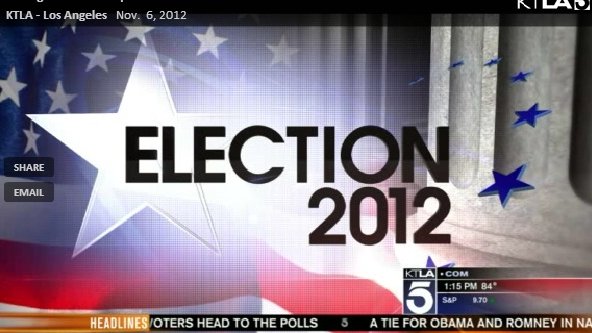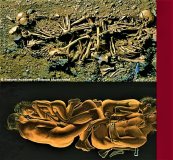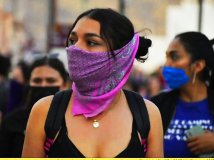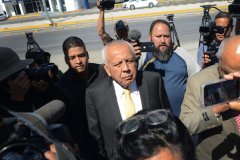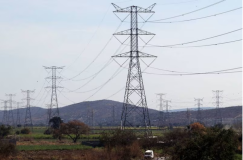Buscar
Director: Froilán Meza Rivera
redaccion@cronicadechihuahua.com
La Crónica de Chihuahua - Relatos urbanos, ciencia, cultura y noticias.
US Presidential Election goes to its final countdown
**In the competition for electoral votes, where the outcome will be decided, the challenger had 8, Obama 3, with 270 needed to win the White House.
La Crónica de Chihuahua
Noviembre de 2012, 18:26 pm
President Barack Obama won Vermont, and former Massachusetts Gov. Mitt Romney countered with Kentucky Tuesday in a duel for the White House, shadowed by a weak economy and high unemployment that crimped middle class dreams for millions.
Romney led in the early popular vote by a margin of 63 percent to 35 percent, unsurprisingly so since many of the early reporting precincts were from reliably Republican Kentucky and Indiana.
In the competition for electoral votes, where the outcome will be decided, the challenger had 8, Obama 3, with 270 needed to win the White House.
Voters also chose a new Congress to serve alongside the man who will be inaugurated president in January, Democrats defending their majority in the Senate, and Republicans in the House. Eleven states picked governors, and ballot measures ranging from gay marriage to gambling dotted ballots.
The economy was rated the top issue by about 60 percent of voters surveyed as they left their polling places. About 4 in 10 said it is on the mend.
More than that said conditions are as bad or getting worse, but a significant fraction said former President George W. Bush bears more of the responsibility than Obama. The survey was conducted for The Associated Press and a group of television networks.
The long campaign’s cost soared into the billions, much of it spent on negative ads, some harshly so.
In the presidential race, an estimated one million commercials aired in nine battleground states where the rival camps agreed the election was most likely to be settled — Ohio, New Hampshire, Virginia, Florida, North Carolina, Wisconsin, Iowa, Colorado and Nevada. They accounted for 110 of the 270 electoral votes needed for victory, and they drew repeated appearances by the 51-year-old president and Romney, 65.
Romney raced to Ohio and Pennsylvania for Election Day campaigning and projected confidence as he flew home to Massachusetts to await the results. "We fought to the very end, and I think that’s why we’ll be successful," he said, adding that he had finished writing a speech anticipating victory.
Obama made get-out-the-vote calls from a campaign office near his home in Chicago and found time for his traditional Election Day basketball game with friends. Addressing his rival, he said, "I also want to say to Gov. Romney, ’Congratulations on a spirited campaign.’ I know his supporters are just as engaged, just as enthusiastic and working just as hard today." Romney, in turn, congratulated the president for running a "strong campaign."
Other than the battlegrounds, big states were virtually ignored in the final months of the campaign. Romney wrote off New York, Illinois and California, while Obama made no attempt to carry Texas, much of the South or the Rocky Mountain region other than Colorado.
There were 33 Senate seats on the ballot, 23 of them defended by Democrats and the rest by Republicans.
The GOP needed a gain of three for a majority if Romney won, and four if Obama was re-elected. Neither Majority Leader Harry Reid of Nevada nor GOP leader Mitch McConnell of Kentucky was on the ballot, but each had high stakes in the outcome.
All 435 House seats were on the ballot, including five where one lawmaker ran against another as a result of once-a-decade redistricting to take population shifts into account. Democrats needed to pick up 25 seats to gain the majority they lost two years ago.
Depending on the outcome of a few races, it was possible that white men would wind up in a minority in the Democratic caucus for the first time.
Speaker John A. Boehner, R-Ohio, raised millions to finance get-out-the-vote operations in states without a robust presidential campaign, New York, Illinois and California among them. His goal was to minimize any losses, or possibly even gain ground, no matter Romney’s fate. House Democratic leader Rep. Nancy Pelosi of California campaigned aggressively, as well, and faced an uncertain political future if her party failed to win control.
In gubernatorial races, Republicans hoped to gain seats after Democratic retirements in New Hampshire, Washington, Montana and especially North Carolina.
Romney was in Massachusetts after his Election Day dash to Ohio and Pennsylvania.
In a campaign that traversed contested Republican primaries last winter and spring, a pair of political conventions this summer and three presidential debates, Obama, Romney, Vice President Joe Biden and Republican running mate Paul Ryan spoke at hundreds of rallies, were serenaded by Bruce Springstein and Meat Loaf and washed down hamburgers, pizza, barbecue and burrito bowls.
©2024 La Crónica de Chihuahua - Relatos urbanos, ciencia, cultura y noticias
La Crónica de Chihuahua es un diario independiente, enfocado a describir las singularidades y la cotidianidad de la comunidad chihuahuense.

